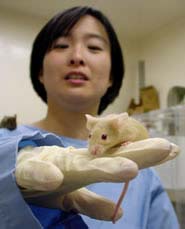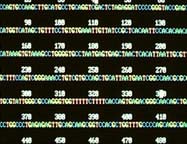
Missing protein leaves mice impervious to pain
Researchers have a new lead for treating pain. A protein called DREAM appears to play a key role in how mice respond to heat, touch and inflammation 1 .
Mice lacking DREAM seem oblivious to all types of pain, find Josef Penninger and his colleagues at The AMGEN Institute, Toronto, Canada. The animals can bear acute pain – the kind caused for example by heat, pressure, or injections as well as chronic inflammatory
One way to make aeroplanes fly more efficiently is to drill millions of tiny holes in the leading edges of the wings. Like the dimples on a golf ball this has the effect of reducing drag. However, producing these holes on a manufacturing scale is not yet commercially feasible.
Researchers at Heriot-Watt University, funded by the Engineering and Physical Sciences Research Council, and the aerospace company BAE SYSTEMS, have carried out a series of fundamental studies on drilling such holes
While the rest of world has warmed, Antarctica has grown chillier, scientists say. According to a new study, air temperature on the southernmost continent fell by 0.7 degree Celsius per decade between 1986 and 2000 – a cooling trend that has come with ecological consequences.
The findings may come as a surprise to climate researchers. Conventional wisdom holds that the polar regions should be the first to show the effects of global warming. And previous work has indeed detected increased t
CORDIS, the European Commission`s Research and Development Information Service, is offering a new online service dedicated to science and technology foresight and the future of European research. The service is part of the re-launch of a redesigned and upgraded CORDIS `Research beyond 2002` site to reflect the latest developments on both the European research area (ERA) and the Sixth Framework programme (FP6).
Technology Foresight
The new service provides information on res

Knowing the human genetic sequence helps unearth invaders.
Human DNA is a new device for disease detectives. The database of human genetics can expose misfit microbe genes in diseased tissues, a US team have found.
Matthew Meyerson, of the Dana-Farber Cancer Institute in Boston, and his colleagues compared 7,000 DNA sequences extracted from cervical cancer cells to the vast database of human genes – and pulled out two misfits. Both were from a virus known to cause the cancer
The ‘humble’ aspirin, which has been known for at least a decade to prevent heart attacks and strokes in thousands of people at high risk of cardiovascular disease, is still massively underused, according to new research published today (Fri Jan 11) in the British Medical Journal.
Previous studies show that aspirin (and other antiplatelet drugs) could prevent around 100,000 premature deaths worldwide every year, including at least 7,000 per year in Britain alone. As a result, aspirin is almo